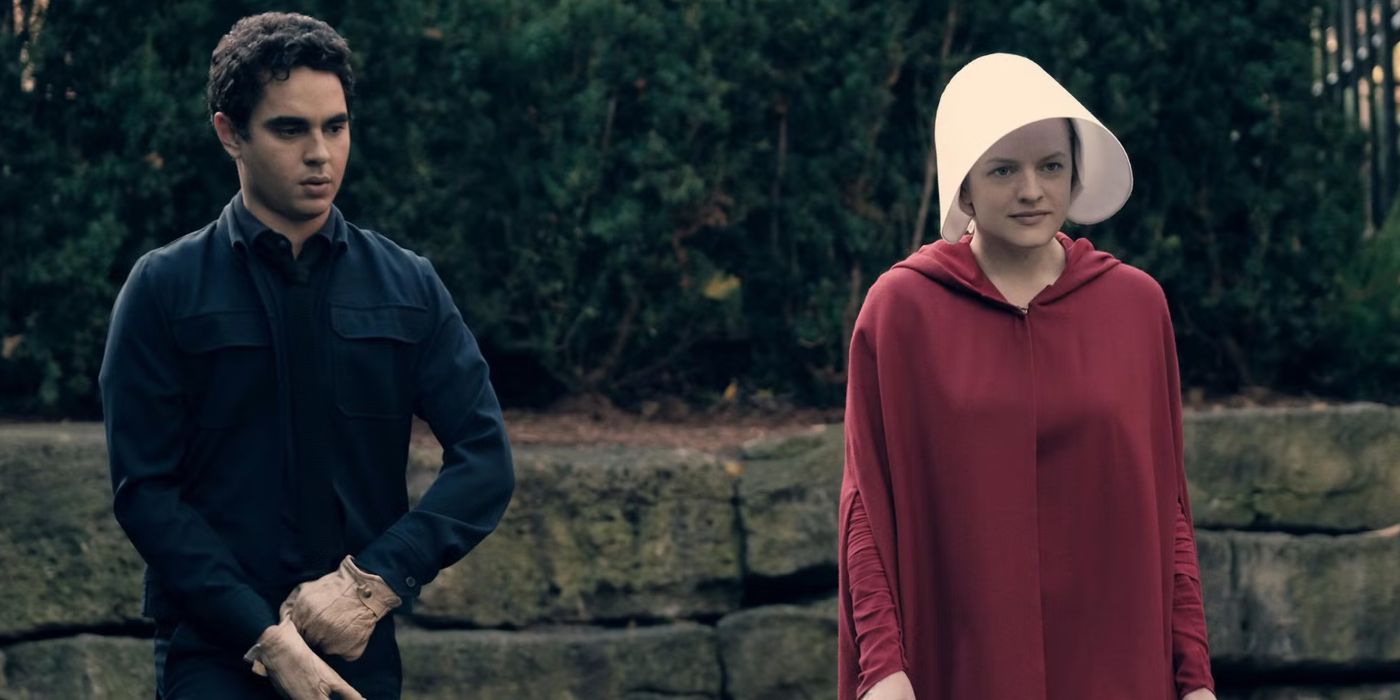
Nick’s Betrayal In ‘The Handmaid’s Tale’ Proves When Push Comes To Shove, Men Will Only Help If It Serves Them

This article contains spoilers for Handmaid’s Tale, Season 6, Episode 6.
If, like me, you’ve spent the last few years watching The Handmaid’s Tale trying to figure out who the good guys really are, clinging to the idea that maybe, just maybe, Nick (Max Minghella) was one of them, then I hate to break it to you, but you should probably stop watching Season 6, Episode 6 before the final scene. Because, spoiler alert, in the final few minutes of the episode we finally see it: Nick might love June (Elisabeth Moss), or at least his version of love, but what he loves most is himself and his power. And he will protect that at all costs, including June.

The episode begins and once again, we’re hopeful. Nick is helping June retrieve letters from Jezebels, could this be the moment Nick does the right thing? Is he going to Jezebel’s to help? To free the girls? Can he keep her secret of the May Day plan to bring down the commanders? Will we finally see that his love for her, for Nicole, is stronger than the grip Gilead has on him? The whole episode builds on that belief. It feeds the fantasy that maybe, just maybe, he’s different. That he’s not like the rest of them. But as the saying goes: the greater the expectation, the greater the disappointment. And by the time the truth unravels, I was forced to admit it, maybe Nick isn’t the man we wanted him to be. Maybe he never was.
Before the truth is revealed we hear Nick tell June, ‘Sometimes I think you’re the only good thing in my life,’ and she believes him. I believed him. We’ve seen how their story started. In the darkest of times, they found each other. There was that small flicker of light, a moment of joy, of normality, of freedom and for a long time, that’s what Nick symbolised. Unlike the other men in Gilead, he seemed to offer something different: autonomy, kindness, risk. He had put his life on the line for June. He had protected her. He had made us believe he was doing it for her, maybe even for all women. And I had held onto the idea that he wasn’t just another cog in Gilead’s machine. That he was the exception. That he symbolised some kind of hope.

When Nick says without Gilead, he’d be nothing, an uber driver or a delivery guy, we see how little he truly values himself. It is this belief that leads him to say he wouldn’t be around people like her. And the painful part is, I think she believes that too. Gilead, for all its horrors, has given Nick something he never had – a sense of value, of structure, of identity. After a traumatic upbringing and a life of fending for himself, he didn’t have a choice. And I trusted him.
I wasn’t alone in my misguided trust, as the episode continues, June still sees that version of him too. She sees the man she loves as trapped, not complicit. She sees someone vulnerable, someone who’s in this position because he has to be, not because he wants to be. And deep down, she still believed he would always choose her.

As he tells June, ‘I love you, it has always been you,’ Once again I feel that flicker of hope, that love really can conquer all. Could this be the happy ending? Would June choose Nick over Luke (O-T Fagbenle) once and for all? That, maybe, just maybe he is the good guy after all. But if the last five seasons of The Handmaid’s Tale have taught us anything, it’s that life in Gilead is no romcom.
As the episode comes to a close we find out that whilst Nick has been promising June the world he has sacrificed her secret to save himself. This confession changes everything. It strips away the fantasy and forces us to see him for who he really is: not a hero trapped in the system, but a man who needs the system in order to feel significant. Nick didn’t just survive in Gilead, he thrived. He rose through the ranks, built a life, took a wife, fathered a child, and carved out a status that would’ve been unreachable for him in any other world. Even if that world meant true freedom.
:max_bytes(150000):strip_icc()/the-handmaids-tale-season-6-episode-1-train-max-minghella-josh-charles-040725-584ea08b24db44c095f0c02099ad4e1c.jpg)
And that’s the tragedy. Because June, despite everything she’s endured, still believes in the possibility of redemption, that love could be a reason for change. Until she realises he is the same as all the others.
Nick used to represent something different. A man who loved her. A man who listened. A man who chose her, over and over, when she was at her most powerless. But as this episode shows, love alone isn’t enough, not when it competes with power, comfort, and control. Not when survival becomes identity.

What’s clever, and often disturbing about The Handmaid’s Tale is how the unthinkable mirrors real life in its most disturbing truth. So many women, like myself, have clung to the hope that someone will change for them, that love will be enough to pull someone out of their toxic patterns or away from systems that benefit them. The belief that this time it will be an exception. That our connection is strong enough to be the thing that turns a bad boy good. But more often than not, people show us exactly who they are and we just don’t want to believe them.
Maybe that’s the real heartbreak here: not that Nick chose Gilead. Not even that he chose himself. But that deep down, we always knew he would, we were just hoping he wouldn’t. Well, I was anyway.